The 2013 MacBook Air: Core i5-4250U vs. Core i7-4650U
by Anand Lal Shimpi on July 4, 2013 8:00 AM ESTBoot Performance
Although boot performance doesn't change substantially with the faster CPU, I did notice that the new system was posting better boot times than what I had previously recorded. My guess is all of my SSD torturing hadn't been TRIMed away before I presented the previous results. Either way the new MBA seems capable of a sub-12 second boot time. I even recorded some boots as low as 10.8 seconds. That PCIe SSD comes in handy for sure.
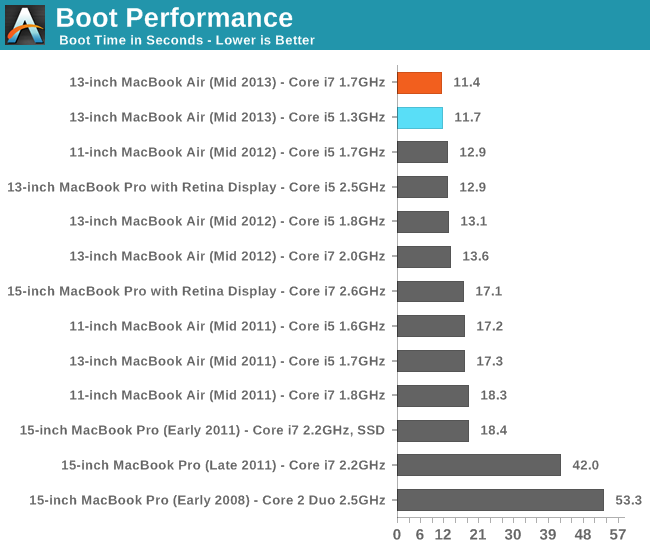
Single Threaded FP & 3D Rendering Performance
These next two charts look at single and multithreaded floating point performance using Cinebench 11.5. This test also gives us the rare opportunity of comparing to some older Mac Pro hardware as well from 2008 - 2010. Single threaded performance remains extremely important to overall system responsiveness, so it's always good to look at.
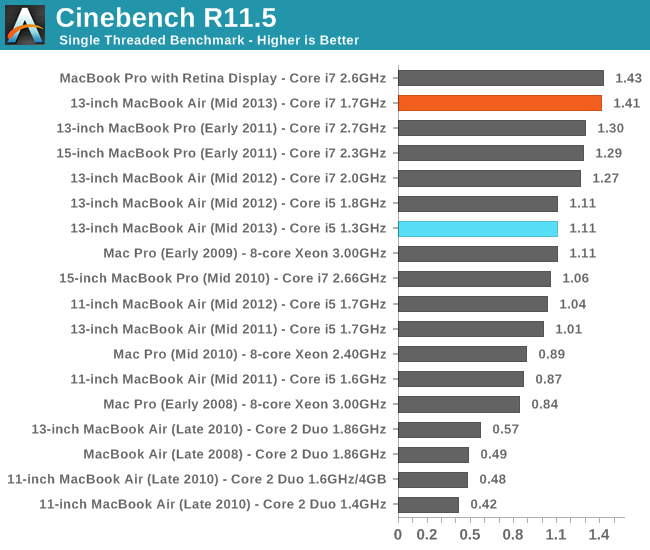
Oh man, the Core i7 upgraded seriously fixes everything. We get near perfect scaling here, showing a massive 27% increase in performance over the default Core i5 1.3GHz setup. The single threaded performance of the upgraded 13-inch MacBook Air is almost able to equal that of the 15-inch MacBook Pro with Retina Display. Anyone underwhelmed by Haswell should keep this in mind. What we're seeing here is a combination of IPC improvements and awesomely aggressive turbo, all within a 15W TDP.
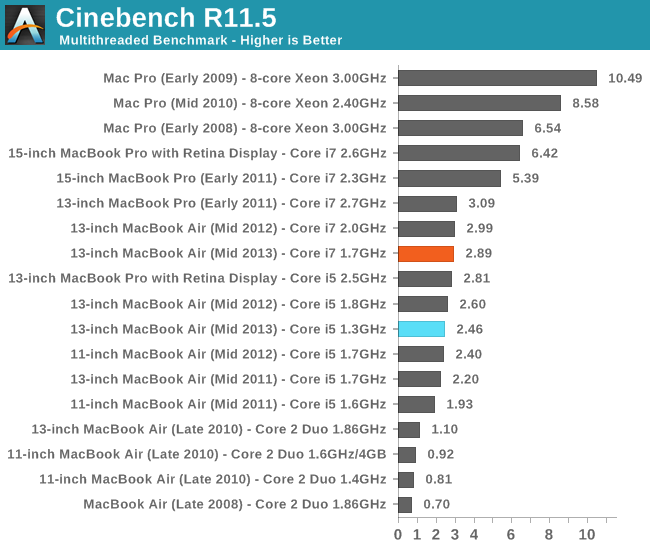
The multithreaded story is a bit less impressive, but still quite good. Showing a 17% increase in performance, the 1.7GHz Core i7 delivers nearly the same performance as the 2GHz Core i7 upgrade from last year's MBA. The rMBP15 distances itself from the MacBook Air though - there's no replacement for more cores.
Video Transcoding Performance
Video transcoding is really best suited for the higher end machines, but that doesn't change the fact that it's done on MacBook Airs as well. We'll start by looking at performance under iMovie. Here we're importing 1080p video from a Nikon D7000 and optimizing it during import.
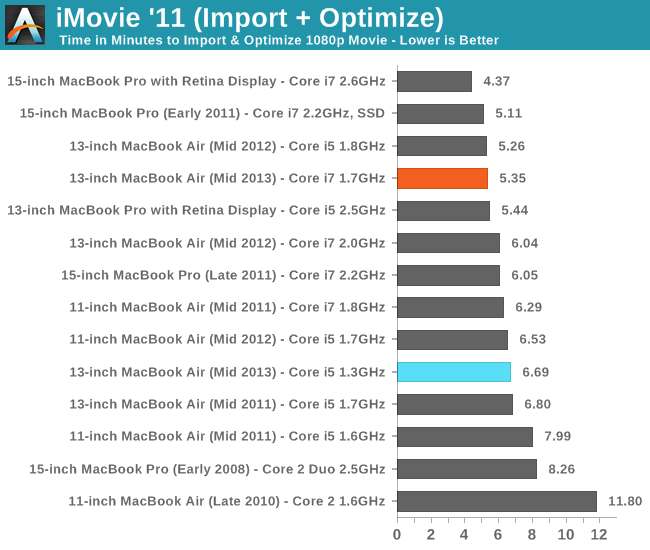
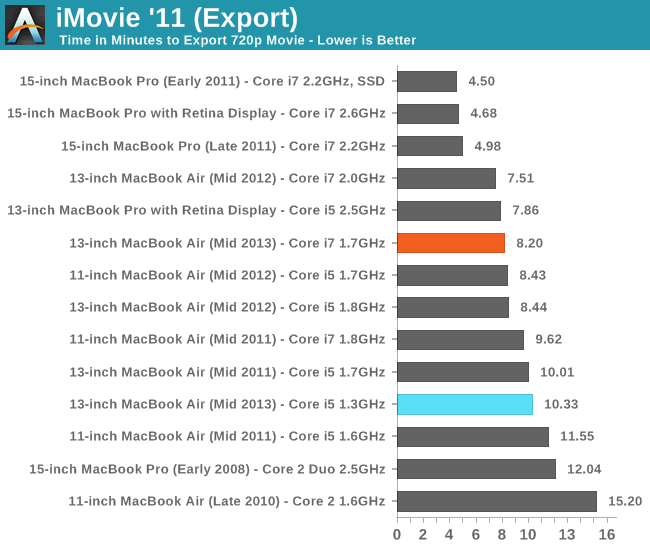
We're showing ~25% reductions in import and export time here over the base configuration. In both cases, performance equivalency with last year's upgraded configuration seems restored.
Final Cut Pro X falls on the professional end of the video production spectrum. The test file is the same here, but the workload is far more strenuous.
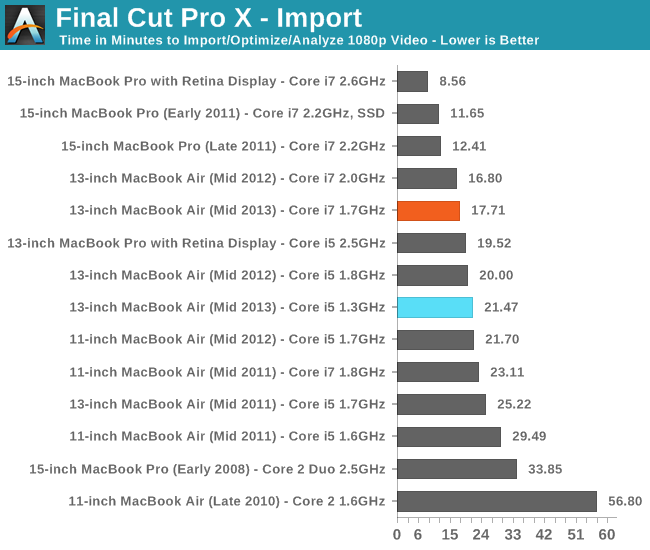
The same is true for our FCPX test. Last year's 2.0GHz model is about 5% quicker than this year's 1.7GHz Haswell ULT system, but obviously with the newer machine you get much better battery life. The improvement over the base CPU configuration is over 20% again.
Photo Editing & Export Performance
Our photo editing & export tests agree with what we've seen elsewhere. The gains here are north of 20% and put the i7 system within range of last year's 2GHz model.
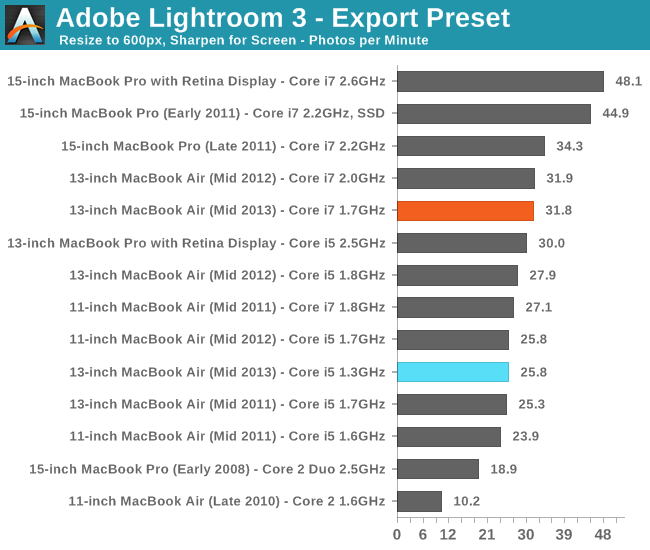
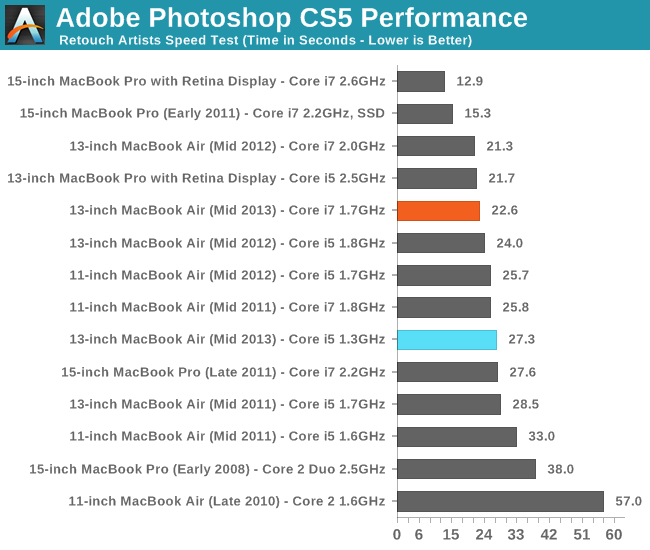
Xcode Performance
In our desktop review of Haswell I noted that performance in our compile test improved tremendously with the new architecture. As it's quite obvious that Haswell's IPC advantages don't surface all that much in our traditional suite, I wanted to see if perhaps things would be different in something that might lend itself better to Haswell's IPC improvements. I repeated our Firefox build test but under OS X. It's a multithreaded compile, with the number of threads set to 2x the number of cores (not threads) in a system.
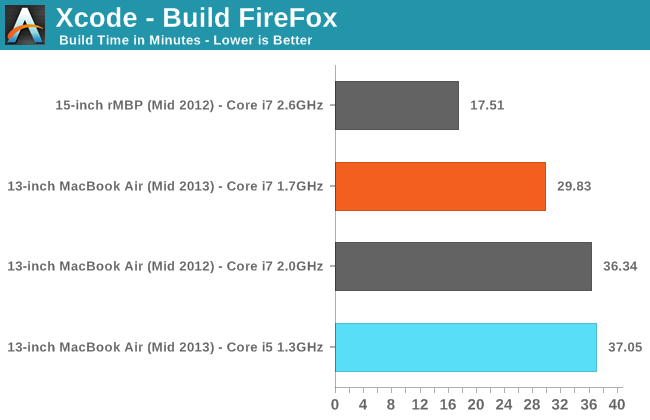
When Haswell's IPC advantage can shine, the higher clocked configuration does even more so. Here the 1.7GHz Core i7-4650U is over 20% faster than the fastest MacBook Air you could build last year. Serious developers will still want more cores but if you need ultimate portability, Haswell ULT really can shine.










127 Comments
View All Comments
KitsuneKnight - Friday, July 5, 2013 - link
> Why did Apple decide to use 2x PCI-E 2.0 for its SSD instead of 4x like the one Samsung shown.If Apple's current SSD can't completely saturate a 2x interface (that's 1 GB/second!), why bother with a 4x interface?
robco - Saturday, July 6, 2013 - link
There's ready, and then there's ready to ship in volume. Apple sells a lot of Airs. Relying on a single supplier, one whose relationship with Apple is already strained, is probably not a good idea.f0rumwh0re - Friday, July 5, 2013 - link
I'm not a PC or a Mac fanboi. I have ~8 PCs, a couple Androids, and there are two iPads, an iPod, and a iPhone 4 in my house. I think the bigscreen teevee has a chip but I never bothered to find out.Being anti-Mac or PC just limits yourself.
Why do that?
I will use whatever tool does the job.
I *prefer* windows but I can get around in a mac, get messages in the droid, and I admit,the iPhone... just works. works great in a walled garden but works. I find hating a thing, to be limiting to oneself.
lmcd - Friday, July 5, 2013 - link
Anyone looking at the i7 version with disdain for power -- when this device isn't given a loop but instead a "race to idle" situation, it will get better battery life than the i5 version, hence the win in the "light" bench.Also, please note that the Air was never meant to be a performance beast, and as such it's not a disappointment that the i5 Air underperformed next to last year's model. The battery life win is more than enough of a compensation.
Sushisamurai - Friday, July 5, 2013 - link
Sweet. I was waiting for this, thanks *goes off to buy the i7 MBA*alittleteap0t - Saturday, July 6, 2013 - link
I bought my Mom a previous gen MBA 11"; her letting me borrow it for 2 weeks was enough for me to want one for myself. I was formerly big on Lenovo, but have since switched to HP mobile workstations. I bought a BTO 13" MBA, 1.7 GHz, 8 GB RAM, 256GB SSD, and it took about a week to ship to my door. It's a decent Windows laptop and gets around ten hours of battery life - very easy to do many things on it and ignore the power plug for a while.geok1ng - Saturday, July 6, 2013 - link
I beg to differ from the conclusion. The performance gap between the SKUs is greater than the battery life gap. Since both systems have equivalent idle numbers, with a nominal advantage going for the i7, in most usage scenarios the race to idle would be equal, if not benefitting the i7 part.USD 150 for more 4GB of RAM and better performance/watt? Sounds fair enough, which when talking about Apple price policies is as best as it gets.
mutatio - Saturday, July 6, 2013 - link
It'll be interesting to see how or if the battery life changes once Mavericks rolls out, given all the commentary in the WWDC keynote about how it is supposed to help with that. Any chance you have your hands on a Mavericks Developer's preview, Anand?captainBOB - Monday, July 8, 2013 - link
Of course he does, but he's under NDA, like all the other developers.Besides, Mavericks is still in beta, it wouldn't be an accurate test.
jabber - Sunday, July 7, 2013 - link
I was on vacation witjh my best buddy last weekend. Was a nice hot sunny day. He pulled out his two day old Macbook Air to show me.He powered it up and about two minutes later it went "plink".
Dead as a doornail.
Oh well.